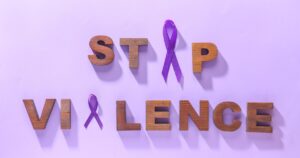If you or someone you know is experiencing domestic violence in Queensland or anywhere in Australia, it is crucial to know how to report it safely and your legal rights to protect yourself or your loved one from further harm.
In Australia the Bureau of Statistics estimate that 20% of people suffered domestic violence or abuse in 2023, which with rising financial pressures on families, these numbers are said to be higher in 2024.
In this blog, we will discuss the steps you can take to report domestic violence safely in Queensland, and your legal tights to help you protect yourself or others from abuse.
Please note, this article is a guide on your legal rights. If you, a friend or anyone you know are in danger of any kind, please call the Police immediately on 000.
Please also find other Australian emergency numbers below:
- DVConnect Womensline: 1800 811 811 – 24 hours, 7 days a week.
- National helpline: 1800 RESPECT – 1800 737 732 – 24 hours, 7 days a week.
- Policelink: 131 444 – 24 hours, 7 days a week.
- DVConnect Mensline: 1800 600 636 – 9 am to midnight, 7 days a week.
Key notes about this article:
- If you or anyone you know are in danger, please call the Police on 000 immediately.
- Domestic violence can be physical or mental abuse.
- Expert family law firms like VM Family Law can help you protect your legal and financial rights.
What is Domestic Violence?
In Queensland, domestic violence is a serious issue that affects many individuals and families.
It’s any pattern of abusive behaviour within an intimate relationship that causes physical, psychological, or emotional harm, or when one person attempts to control or frighten you.
Domestic violence, or “domestic abuse” typically refers to violence that occurs within intimate relationships or households. It encompasses violence that happens between current or former partners, spouses, family members, or people who live together. This distinguishes domestic violence from other forms of violence that may occur outside of these types of relationships.
This abuse goes beyond physical harm and can include threats, stalking, or financial control. For example, being forced to explain every dollar spent or given a minimal allowance. It can also involve isolation from friends and family, leading to feelings of entrapment and loneliness.
Recognising these signs is crucial, as domestic violence often escalates over time, and it’s important to seek help and support and learn how to report domestic violence if you or someone you know is experiencing it.

What Are The Types of Domestic Violence?
Domestic violence in Queensland and Australia manifests in various forms, each impacting victims differently. Understanding these types helps you recognise the signs and seek appropriate help, ensuring that you or someone you know can find safety and support in a difficult situation.
Physical Violence
Physical violence involves any act that causes physical harm or injury to the victim. This can include hitting, slapping, pushing, or using weapons to inflict pain. The visible injuries can be severe, but even minor incidents can lead to lasting trauma.
Emotional or Psychological Abuse
Emotional or psychological abuse involves behaviours that cause emotional harm and undermine the victim’s mental health. This can include constant criticism, humiliation, threats, and manipulation. You might feel worthless, scared, or anxious, impacting your self-esteem and mental well-being.
Sexual Violence
Sexual violence encompasses any non-consensual sexual act or behaviour. It can include rape, coerced sexual activities, or any unwanted sexual contact. This type of abuse profoundly affects your sense of safety and bodily autonomy
Financial or Economic Abuse
Financial or economic abuse occurs when the abuser controls your financial resources or access to money. This might involve restricting your ability to work, taking your earnings, or providing an inadequate allowance. Such control can leave you financially dependent and unable to escape the abusive situation.
Social Abuse
Social abuse involves isolating you from friends, family, or social networks. The abuser might control your communications, monitor your movements, or prevent you from seeing loved ones. This isolation can make you feel alone and more dependent on the abuser.
At VM Family Law, we offer compassionate support and legal guidance to help you recognise the signs of abuse and take action towards safety and healing. Contact us today to break free from domestic violence and move towards a brighter future.
Impact of Domestic Violence on Victims and Families
Domestic violence has far-reaching consequences for both victims and their families, affecting family relationships. It can have a significant impact on mental health, leading to anxiety, depression, post-traumatic stress disorder (PTSD), and even suicidal thoughts.
The constant fear, uncertainty, and manipulation experienced by victims can erode their self-esteem and sense of worth. This highlights the important consideration of a pattern of behaviour that includes abuse, coercive control, and even neglect.
Here are the common effects of domestic violence:
- Physical Impact: Victims of domestic violence often suffer physical injuries. These injuries, no matter how minor can have long-term health consequences, and in the most ever cases may even result in death.
- Emotional and Psychological Impact: The emotional and psychological toll of domestic violence can be profound, and is often the most unspoken form of domestic violence amongst those are victim to it. Victims may experience anxiety, depression, post-traumatic stress disorder (PTSD), and feelings of shame or worthlessness. Children who witness domestic violence may also develop emotional and behavioural problems that they can very sadly carry into adulthood without even being able to recognise it in many cases.
- Financial Impact: Domestic violence can have significant financial consequences for victims and their families. Victims may lose their jobs due to injuries or absences caused by the abuse, and they may also face financial control or sabotage from the abuser, leaving them financially dependent and unable to leave the abusive situation.
- Interpersonal Impact: Domestic violence can strain relationships within families and communities. Children who witness domestic violence may have difficulty forming healthy relationships in the future.
- Societal Impact: Domestic violence has a serious effect on the victims and broader community. If not stopped, it can also contribute to a culture of violence and abuse that can be perpetuated across generations.
If you are experiencing any form of domestic violence, please contact VM Family Law on 07 3447 8966 or through our website. We will connect you with the right support and services.

What are the causes of Domestic Violence in Queensland?
The Queensland Police Service (QPS), as first responders, recorded over 139,000 DFV occurrences in 2021–22, an increase of close to 48% when compared to the 6 years prior. Here is the article.
In 2024 it is forecasted that these numbers have risen due to the increasing cost of living and the rising financial pressure on most Australian couples and families.
Domestic violence in Queensland, however, is a complex issue with multiple causes. At it’s root, domestic violence often stems from desire for power and control within personal relationships. Factors such as power imbalances, communication issues, and societal norms promoting gender inequality can contribute to domestic violence.
Addressing these issues through education, awareness, and promoting healthy relationships based on respect is crucial for creating safer communities.
There is however, no excuse for any form of domestic violence.
What Are The Domestic Violence Laws in Queensland?
In Queensland, domestic violence laws are primarily governed by the Domestic and Family Violence Protection Act 2012. This legislation aims to provide protection and support to victims of domestic violence by allowing them to apply for a Domestic Violence Protection Order (DVPO) through the Magistrates Court.
A DVPO can include conditions such as prohibiting the perpetrator from contacting or approaching the victim and requiring them to attend counselling or other programs. Breaching a DVPO is a criminal offence and can result in significant penalties including goal.
Additionally, Queensland has implemented the Not Now, Not Ever: Putting an End to Domestic and Family Violence in Queensland report recommendations to strengthen laws and responses to domestic violence, including the establishment of the Domestic and Family Violence Death Review and Advisory Board.
How Do You Prepare A Domestic Violence Protection Order (DVPO)?
Reporting domestic violence is a challenging process, but there are services that are here to help at every step.
If you are in immediate danger, contact emergency services or go to the nearest police station or call 000, the police can provide immediate assistance and ensure your safety.
If you are in the process of applying for a Domestic Violence Protection Order or navigating complex legal proceedings, VM Family Law is committed to providing you with the support and advocacy you deserve. One reason to use a family law firm like VM family law, is that we can help to make sure your financial best interests are protected too – whereas the community and government run services are focused on mental and physical wellbeing. Contact us at 07 3447 8966 or please feel free to meet the team here if you feel a family lawyer is needed to protect your interests.
Here Is A Step-by-Step Guide:
Reporting domestic violence can be a complex process, but following a step-by-step guide can help victims navigate through it. This guide will provide victims with the necessary information and support to report domestic violence safely and effectively.
Step 1: Contact the Authorities And/Or Support Service in Brisbane
When reporting domestic violence in Brisbane, it is important to contact the appropriate authorities. Victims can start by visiting their local police station to report the incidents and provide evidence. The police have the power to issue Domestic Violence Orders (DVOs) to protect victims and restrict the actions of the abuser.
In addition to the police, victims can seek assistance from family law firms and community-based family violence services. These organisations include:
- DVConnect Womensline: 1800 811 811 – 24 hours, 7 days a week.
- National helpline: 1800 RESPECT – 1800 737 732 – 24 hours, 7 days a week.
- Policelink: 131 444 – 24 hours, 7 days a week.
- DVConnect Mensline: 1800 600 636 – 9 am to midnight, 7 days a week.
Step 2: Gather The Necessary Evidence and Documentation
Gathering evidence and documentation, using resources including Legal Aid QLD is crucial when reporting domestic violence. Victims should document incidents of abusive behaviour, including dates, times, and descriptions. They should also collect any physical evidence, such as photographs of injuries or damaged property.
It is important to seek support from family violence services or organisations that specialise in domestic violence. They can provide guidance on what evidence is necessary and help victims navigate the process of gathering documentation.
Step 3: Understand the Reporting And Legal Process
Understanding the reporting process is crucial when reporting domestic violence. It is important to consider some key factors:
- Confidentiality: Victims can request that their information be kept confidential throughout the reporting process to ensure their safety.
- Criminal charges: Depending on the severity of the abuse, criminal charges may be laid against the abuser. Victims should be prepared to provide statements and cooperate with the authorities.
- Evidence: Victims should know the importance of providing evidence and documentation to support their case. This can include medical records, photographs, and witness statements.
Step 4: What to Expect After Reporting
After reporting domestic violence, the perpetrator will be handed with orders in either a form of a DVPO or criminal charges. The victim can expect further support and assistance. Support services and family violence services are available to help victims navigate the legal process, provide counselling and therapeutic support, and offer practical assistance. Support services can help victims access emergency accommodation and financial assistance and help develop safety plans. Family violence services offer counselling, support groups, and referral services to other support organisations.
If you are unsure as to what services are available, or even what you need, please contact VM Family Law on (07) 3447 8966 or on our website, our team will connect you with the right services.

Why Engage A Family Law Firm?
Hiring a family law firm like VM Family Law provides numerous benefits over the government and charity run services, especially in complex and sensitive situations.
Family Lawyers are the experts at providing the right advice, and also protecting your rights, including your financial rights if you are married or in a defacto relationship, which is must for victims to be empowered and move forward.
Here is how we help at VM Family Law:
- Expert Legal Advice: Navigating the legal system can be daunting, particularly when dealing with domestic violence. VM Family Law offers expert legal advice tailored to your unique situation, ensuring you understand your rights and options.
- Comprehensive Support: VM Family Law provides more than just legal representation. Our team offers emotional support and practical guidance, including helping arrange the right service throughout the process, helping you feel confident and supported every step of the way.
- Protection Orders: Obtaining a Domestic Violence Protection Order is crucial for your safety. VM Family Law has extensive experience in securing these orders swiftly and effectively, providing you with the protection you need.
- Experienced Representation: With VM Family Law, you benefit from experienced representation in court. Our lawyers are skilled advocates who will fight tirelessly to protect your interests and secure the best possible outcome for you and your family.
- Confidential and Compassionate Service: We understand the sensitivity of domestic violence cases. VM Family Law ensures all matters are handled with the utmost confidentiality and compassion, respecting your privacy and dignity.
- Long Term Approach Too: VM Family Law takes a long-term approach to family law, addressing not only your immediate legal and DV needs, but also your long-term finances and resources are top of our minds.
It is of course vital to you are seeking immediate help, but you also need to consider what it takes to make a fresh start. For many, a family lawyer is essential to secure the right financial future.
FAQs
How can I recognise the signs of domestic violence?
Recognising the signs of domestic violence is the first step towards seeking help and safety. Here are some common indicators that may suggest you or someone you know is experiencing domestic violence:
- Physical Signs: Unexplained injuries such as bruises, cuts, or worse.
- Emotional Signs: Increased anxiety, depression, or changes in behaviour.
- Isolation: The victim may become isolated from friends, family, or social activities, including those who have suffered physical abuse.
- Financial Control: The abuser may control the victim’s access to money or resources.
- Intimidation: The victim may be intimidated or threatened by the abuser.
- Manipulation: The abuser may use manipulation or coercion to control the victim.
What should I do if I suspect someone I know is experiencing domestic violence?
If you suspect someone you know is experiencing domestic violence, approach the situation with care and sensitivity. Listen to their feelings and experiences without judgment, express concern for their safety, and offer support in finding resources such as counselling or legal assistance. Respect their decisions and understand that they may not be ready to leave the abusive relationship. Encourage them to seek help from a domestic violence hotline or counsellor, prioritising their safety and well-being throughout the process.
What legal options are available to victims of domestic violence?
Victims of domestic violence have several legal options available to protect themselves and their families. One such option is applying for a Domestic Violence Protection Order (DVPO) through the Magistrates Court, which can include conditions to prevent further abuse. Victims can also contact the police for immediate assistance or to enforce a protection order. Seeking tailored legal advice is essential for victims to understand their rights and options for legal protection.
Conclusion
Domestic violence is sadly a prevalent issue in Queensland, impacting individuals and families. Recognising signs, accessing support services, and understanding legal options are vital in breaking the cycle of abuse. Seek help and support if you or someone you know is experiencing domestic violence.
At VM Family Law, we are committed to providing compassionate and expert legal guidance to domestic violence victims. Our experienced team understands the complexities of domestic violence cases and is dedicated to confidently helping you navigate the legal system.
If you or someone you know is experiencing domestic violence, contact us today to learn how we can help you make a report on domestic violence safely. Call us at 07 3447 8966 or click here to schedule a consultation.


